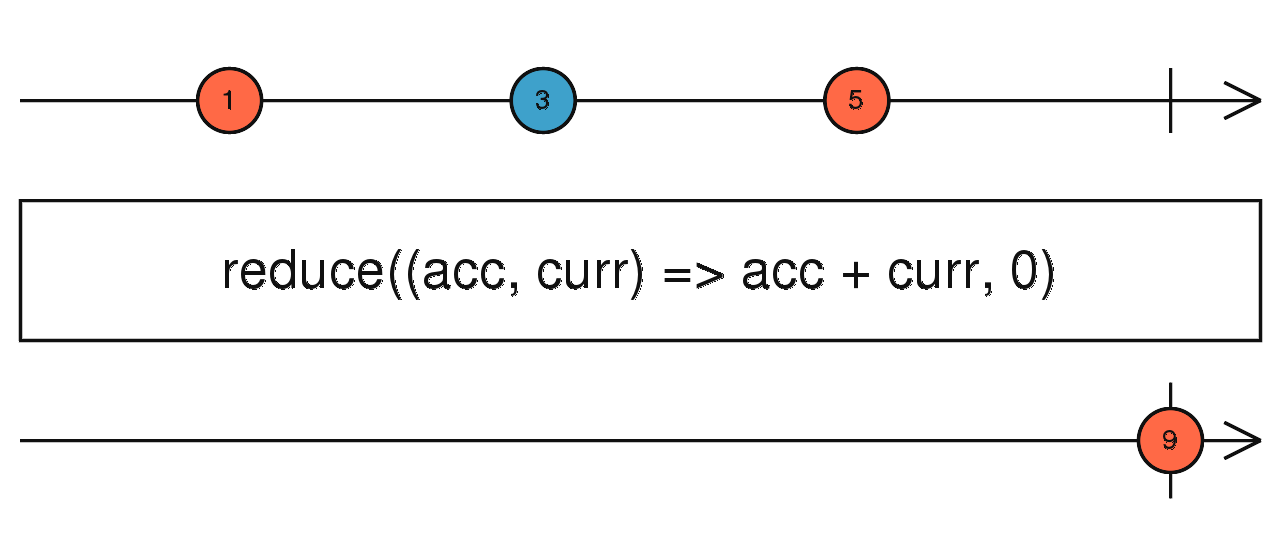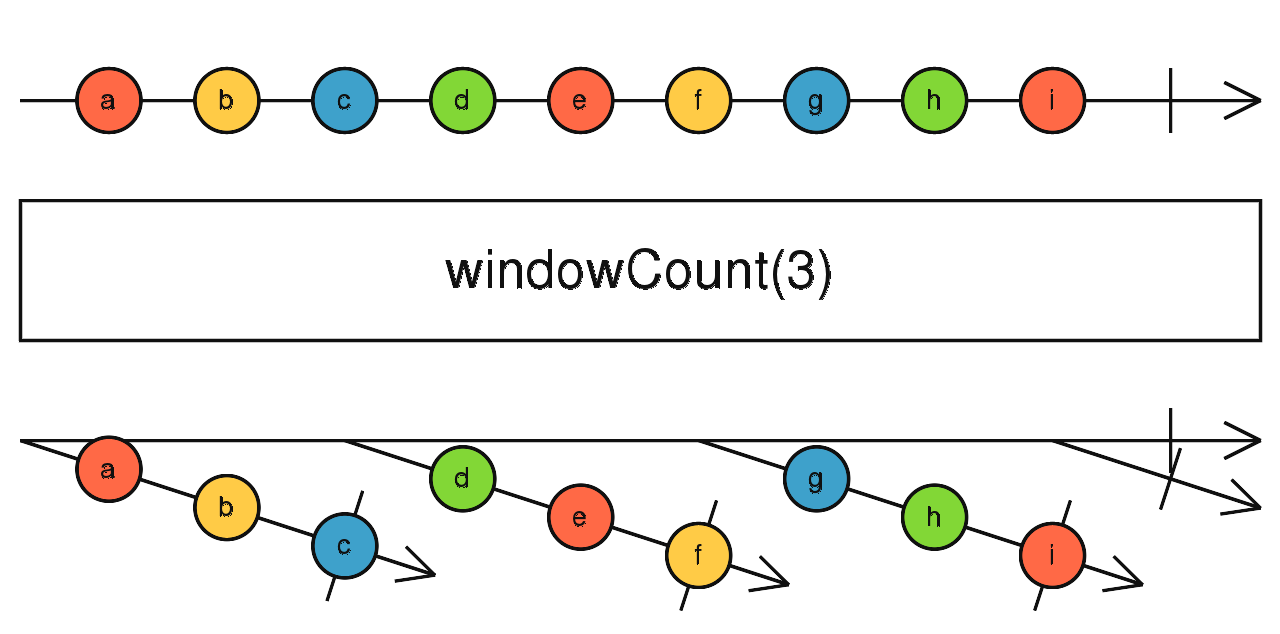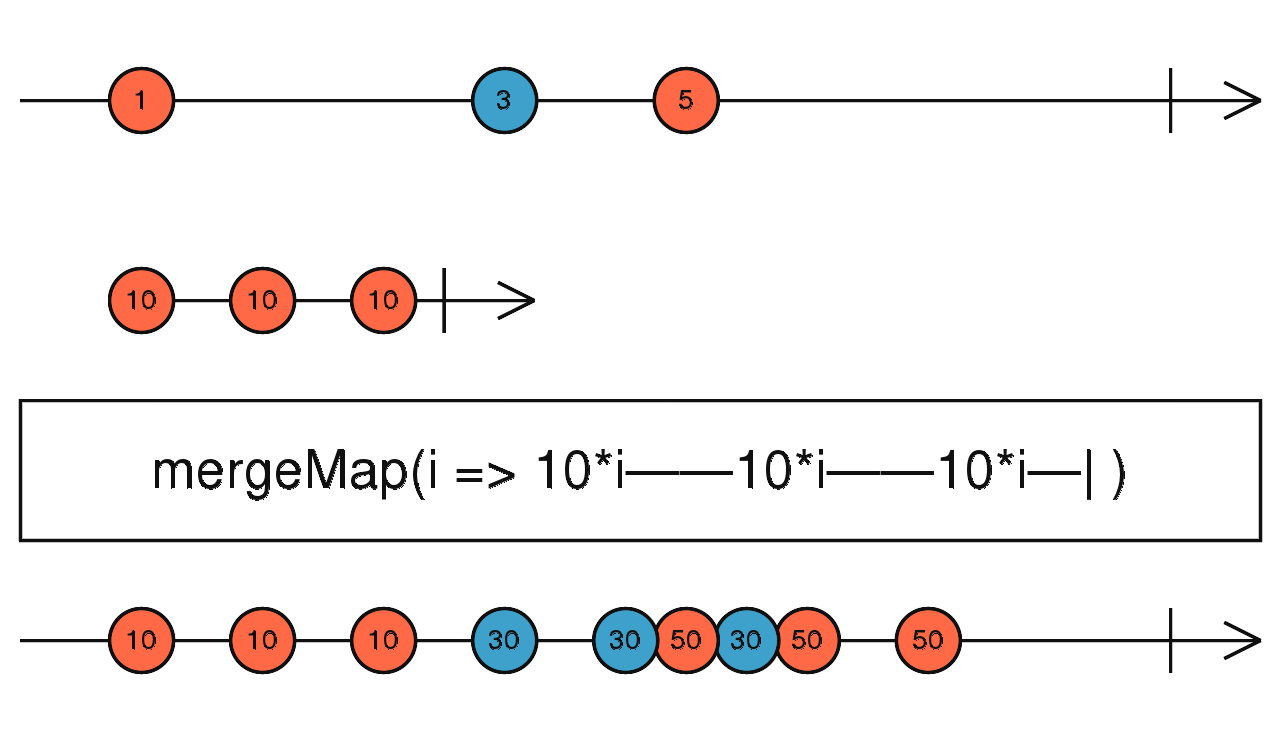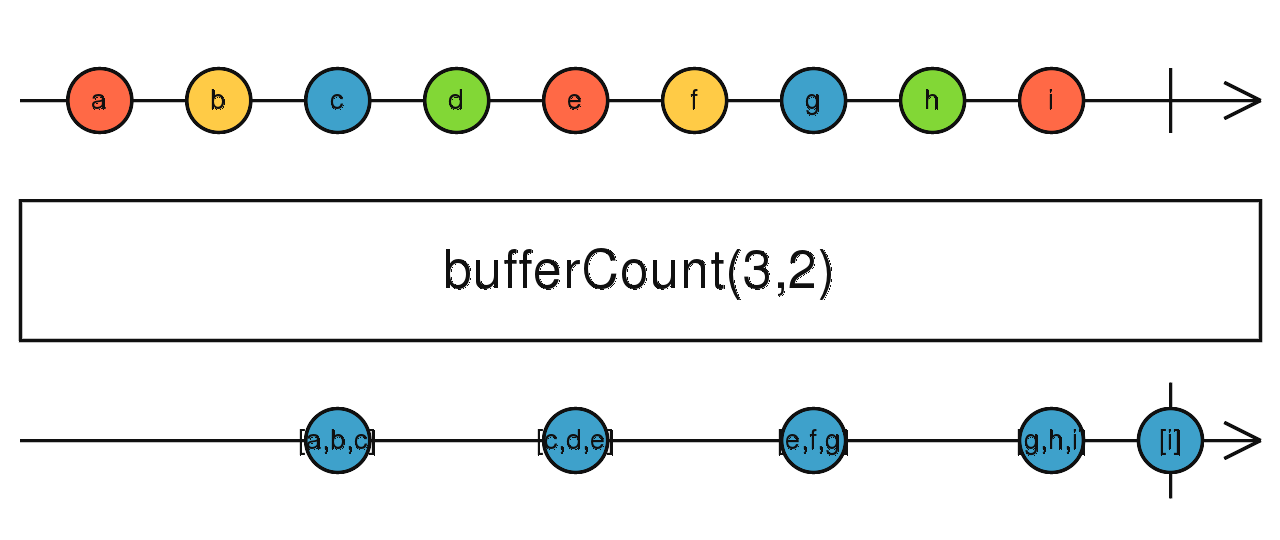FRP Bowling Kata
Installation
To install the application, clone the repository, go to the directory and install dependencies.
bash
git clone git@github.com:wizardwerdna/FRPBowlingKata.git
cd FRPBowlingKata
npm install && tsd installThe system uses webpack, so create an index.html file that integrates
the bundle.js script.
index.html
<!DOCTYPE html>
<html lang="en">
<head>
<meta charset="UTF-8">
<title></title>
</head>
<body>
<div><h1>FRP Bowling Kata</h1</div>
<script src="bundle.js"></script>
</body>
</html>app.ts
console.log('app.ts here');The Scorer$ function
We will first drive out the development of a function, scorer$ which takes as
an input any Observable stream, array or iterable representing a sequence of
integers inclusively between 0 and 10, each representing the number of pins dropped
in a roll of bowling. The function will return an Observable stream of integers
representing the score for each frame of the game.
-- 5-- 5--10--10--10-- 1-- 2|
scorer$
------20----------50--71---(84,87)|
In driving out the development, we will not be concerned about the timing of this stream, but will require that the stream accurately recount the game. Note that the inputs may result in different prefixes, as partial open frames are scored, but if the frame is completed to a spare, then the spare frame will be unscored until the bonus pins are dropped.
-- 5|
scorer$
-- 5| (partial open frame is scored)
-- 5-- 5|
scorer$
--------| (partial spare is unscored)
-- 5-- 5-- 5|
scorer$
-----------(15, 20)| (spare is scored, as is the following partial spare)
-- 5-- 5-- 5-- 5|
scorer$
----------15----| (completed spare is scored, but partial spare is not)
1. EmptyGame
We begin building our first tests, using a simple test driver that logs
test results into the browser console. We also add our first test, scoring an
empty game as the empty stream. The test is red, throwing an error from an
rxjs Observable.
app.ts
import { test, testSuite } from "./testsuite";
test(">>>> BEGIN FRP Bowling Test Suite", testSuite);testsuite.ts
import { Observable } from "rxjs";
const scorer$ = (fromSource) => { return Observable.throw("funny"); };
export function testSuite () {
test("should know the truth", function(){
assertEqual(true, true);
});
test("should score empty game", function(){
scorer$([]).toArray()
.subscribe(
result => assertEqual([], result),
error => console.error("Error: ", error)
);
});
}
function assertEqual(expected, value) {
if (JSON.stringify(expected) === JSON.stringify(value)) {
console.info("%cexpected value %o was returned", "color: green", expected);
} else {
console.error("expected %o, but got %o", expected, value);
}
}
export function test(testName, tests) {
console.group(testName);
tests();
console.groupEnd();
}2. Partial Open Frame
We write code to pass the test, returning the empty Observable.
Observable.empty
Of course, this isn't the end of the game, since every game will be scored as the empty
set. That's precisely the point. In TDD, we write the least and simplest code
to to pass the test. Then, we add more tests to generalize the code. As Uncle Bob
Martin wrote:
As the tests get more specific, the code gets more generic.
scorer.ts
import { Observable } from "rxjs"
export function scorer$(fromSource) {
return Observable.empty();
}Now that we are green, we refactor the tests (yes we refactor tests and code) to shorten the tests. And then go red with a new test to score a gutter ball with the array [0].
testsuite.ts
import { scorer$ } from "./scorer";
export function testSuite () {
test("should know the truth", function(){
assertEqual(true, true);
});
test("should score empty game", function(){
testScorer([], []);
});
test("partial open frame", function(){
testScorer([0], [0]);
});
}
function testScorer(fromSource, expected) {
scorer$(fromSource).toArray()
.subscribe(
result => assertEqual(expected, result),
error => console.error("Error: ", error)
);
}3. Full Open Frame
We score the partial open frame by responding with an Observable that
scores a list of rolls by duplicating it.
Observable.from
Although more generic than, for
example, code distinguishing the empty stream -- from a singleton stream of --0--
any obvious way of implementing that code would be more complex than the
following one-liner:
scorer.ts
export function scorer$(fromSource) {
return Observable.from(fromSource);
}So we generalize when the generalization is simpler than more specific code.
And now we are green. We add a test for a
full open frame of gutter balls (--0--0--) which scores as --0--.
testsuite.ts
test("full open frame", function(){
testScorer([0, 0], [0]);
});4. Full Open Frame 2
scorer.ts
Ok, bear with me. I realize this is a stupid, dumb-as-dirt, way to solve
the two gutter rolls from single gutter rolls. But our tests say the result
is the same for both of them. So our new test fails by copying the [0,0].
It turns out there is a five-character way to do this, so we do this, using
the take Operator
which simple takes the first element of the two cases, or empty, if there are no
elements.
export function scorer$(fromSource) {
return Observable.from(fromSource).take(1);
}Dumb-as-dirt, yes, but its the simplest thing that could possibly work, and it
does. We are green. What now? Easy, add a
test for which the take(1) Operator fails.
testsuite.ts
test("full open frame", function(){
testScorer([0, 0], [0]);
testScorer([0, 1], [1]);
});5. Full Open Frame 3
Sure, taking the first element fails for
this case. But we're much smarter than that. Rxjs has a
takeLast Operator
scorer.ts
export function scorer$(fromSource) {
return Observable.from(fromSource).takeLast(1);
}
Which handles all cases (--, --0--, --0--0--, --0--1--) and we are green
Damn, we are too smart for our own good. But (think Smeagol) we are even smarter yet. We write a better
test that won't trivially. Here's a more specific test that will resolve all the "take-based" operators:
--1--1--, which scores to --2--:
testsuite.ts
test("full open frame", function(){
testScorer([0, 0], [0]);
testScorer([0, 1], [1]);
testScorer([1, 1], [2]);
});6. Two Open Frames
And with that, we are red again. So it seems that a single frame is
not scored just by copying, but rather by adding the elements. Rxjs has an operator for that
too, a familiar one to people who understand the Javascript Array type. Using a reducer to sum
the elements with the
reduce Operator.
scorer.ts
export function scorer$(fromSource) {
return Observable.from(fromSource)
.reduce((acc: any, curr) => acc + curr);
}and we are green. The limitation of this approach, of course, is that adding only makes sense for a single open frame. So we add a test setting up for two open frames one after another. Note that this is now red because adding up all the elements produces just the single [3], rather than the expected result.
testsuite.ts
test("two open frames", function(){
testScorer([0, 0, 1, 2], [0, 3]);
});
7. Two Open Frames 2
This is a bit trickier than the earlier task, because we want to break up the
open frames into separate groups before we reduce it with a sum. Rx has operators
for that, one of which is
windowCount(2) Operator.
This operator will take a stream, and break it up into substreams each of
which has two elements, so that we can operate on each group separately.
If there are an even number of elements, an additional empty stream
appears at the end, and if there are an odd number of elements,
then the last element of the stream is added as a singleton stream.
What we have is a resulting stream of streams, each of which we can reduce.
The problem is that we want to have a flattened stream of the resulting
reductions, and there is an operator for that too:
mergeMap Operator.
Folks familiar with other functional languages may recognize this as a function
called flatMap;
What mergemap does to an Observable of Observables is to first apply the map
function to each supplied inner Observable, and then merge the results together.
For those in the know, this is equivalent to a map, followed by a mergeAll.
scorer.ts
export function scorer$(fromSource) {
return Observable.from(fromSource)
.windowCount(2)
.mergeMap(frame =>
frame.reduce(acc: any, curr) => acc + curr);
}And now we are green. We add another test that shows that the reported score for each frame is not the result of that frame, but the result of that frame added to the previous frame score. The last test finessed that issue because the score of the first frame is 0. So we add a new example where the first frame is non-zero. And now we are red.
testsuite.ts
test("two open frames", function(){
testScorer([0, 1, 1, 2], [1, 4]);
});
8. One Completed Spare
We now add a new operator that handles this. reduce would not suffice,
because it returns a single result, the sum of all the elements in the
stream. Rxjs has yet another useful result: the scan Operator.
Scan performs the acccumulation as does reduce, but emits the result of the process with an element for each time.
scorer.ts
export function scorer$(fromSource) {
const sumReducer = (acc, curr) => acc + curr;
const frameScorer = frame => frame.reduce(sumReducer);
return Observable.from(fromSource)
.windowCount(2)
.mergeMap(frameScorer)
.scan(sumReducer);
}This does the trick, and we are green! Now
we refactor, extracting the function for sum and reduce. This leads to a
nice, concise solution for a game of open frames.
Now, we need to handle some slightly more complex scanarios, the spare and then the strike. We add a test for a simple spare followed by a 5, and we are red.
testsuite.ts
test("one completed spare", function(){
testScorer([5, 5, 5], [15, 20]);
});
9. One Completed Spare 2
The trick with a spare frame is that it scores to 10 points (also the sum of the rolls in that frame), plus the pincount of the next roll, which will also count in the next frame. But this test doesn't require anything special, so we handle it simply by adding a conditional to the frameScorer function.
scorer.ts
export function scorer$(fromSource) {
const sumReducer = (acc, curr) => acc + curr;
const frameScorer = frame =>
frame.reduce((acc, curr) => acc + curr + (acc + curr === 10 ? 5 : 0));
return Observable.from(fromSource)
.windowCount(2)
.mergeMap(frameScorer)
.scan(sumReducer);
}And we are now green, simply by using the constant 5 from the test. (A TDD trick we call a "slime"). Remember, we don't do more than is necessary to pass the test, unless generalizing is an obviously simpler choice. Of course, this elegant solution only works if every spare frame is followed by a 5-pin roll.
So our next test follows the spare with something else, here a 9-pin roll, and now we are red
testsuite.ts
test("one completed spare", function(){
testScorer([5, 5, 5], [15, 20]);
testScorer([5, 5, 9], [19, 28]);
});
10. One Completed Strike
We have a few steps to solve this puzzle. The first is to figure out
how to "look ahead" to the next frame, and then to parse that frame
for the result. Again, we exploit a special Rxjs operator:
bufferCount Operator.
This reduces a stream of values into a stream of arrays, of the length passed in
as the first parameter. If a second parameter is given, then the next array starts
that many items after the last one. Thus for the example stream in our test:
--5--5--9--|, bufferCount(3,1)
results in the stream: --[5,5,9]--[5,9]--[9]--. Then, we break that stream
up into the observable of observables, the first one having the first two
elements --[5,5,9]--[5,9]--, and the second one having the remainder --[9]--
Then, to score a substream (we call them frames), we pick off the first roll of that substream and check to see if its a spare. If so, we add all three elements, otherwise we add the first two, as we would for any open frame.
scorer.ts
export function scorer$(fromSource) {
const sumReducer = (acc, curr) => acc + curr;
const frameScorer = frame =>
frame.
take(1).
map(rolls =>
rolls[0] + rolls[1] === 10 ?
rolls.reduce(sumReducer) :
rolls[0] + (rolls[1] || 0)
);
return Observable.from(fromSource)
.bufferCount(3, 1) // change rolls into triplets
.windowCount(2) // break frames into two-roll sets
.mergeMap(frameScorer)// score each frame separately
.scan(sumReducer); // add the frames
}testsuite.ts
test("one completed strike", function(){
testScorer([10, 1, 2], [13, 16]);
});
11. Partial Mark Frames
scorer.ts
export function scorer$(fromSource) {
const sumReducer = (acc, curr) => acc + curr;
const frameScorer = frame =>
frame.
take(1).
map(rolls =>
rolls.pins[0] === 10 || rolls.pins[0] + rolls.pins[1] === 10 ?
rolls.pins.reduce(sumReducer) :
rolls.pins[0] + (rolls.pins[1] || 0)
);
const frameReducer =
(acc, curr) => {
if (curr[0] === 10 && acc.isLastInFrame)
return {
frame: acc.frame + 1,
isLastInFrame: true,
pins: curr
};
else
return {
frame: acc.isLastInFrame ? acc.frame + 1 : acc.frame,
isLastInFrame: !acc.isLastInFrame,
pins: curr
};
};
const sourceToFrame$ = fromSource =>
Observable.from(fromSource)
.bufferCount(3, 1)
.scan(frameReducer, {isLastInFrame: true, frame: 0});
return sourceToFrame$(fromSource)
.groupBy(roll => roll.frame)
.mergeMap(frameScorer)
.scan(sumReducer)
.take(10);
}testsuite.ts
test("partial spare", function(){
testScorer([5, 5], []);
});
test("partial strike", function(){
testScorer([10], []);
testScorer([10, 5], []);
testScorer([10, 10], []);
});
test("zero game", function(){
testScorer(
[0, 0, 0, 0, 0, 0, 0, 0, 0, 0, 0, 0, 0, 0, 0, 0, 0, 0, 0, 0],
[0, 0, 0, 0, 0, 0, 0, 0, 0, 0]
);
});
test("spare game", function(){
testScorer(
[5, 5, 5, 5, 5, 5, 5, 5, 5, 5, 5, 5, 5, 5, 5, 5, 5, 5, 5, 5, 5],
[15, 30, 45, 60, 75, 90, 105, 120, 135, 150]
);
});
test("perfect game", function(){
testScorer(
[10, 10, 10, 10, 10, 10, 10, 10, 10, 10, 10, 10],
[30, 60, 90, 120, 150, 180, 210, 240, 270, 300]
);
});
12. Completed Scorer
scorer.ts
export function scorer$(fromSource) {
const sumReducer = (acc, curr) => acc + curr;
const frameScorer = frame =>
frame.
take(1).
map(rolls =>
rolls.pins[0] === 10 || rolls.pins[0] + rolls.pins[1] === 10 ?
rolls.pins.reduce(sumReducer) :
rolls.pins[0] + (rolls.pins[1] || 0)
);
const frameReducer =
(acc, curr) => {
if (curr[0] === 10 && acc.isLastInFrame)
return {
frame: acc.frame + 1,
isLastInFrame: true,
pins: curr
};
else
return {
frame: acc.isLastInFrame ? acc.frame + 1 : acc.frame,
isLastInFrame: !acc.isLastInFrame,
pins: curr
};
};
const sourceToFrame$ = fromSource =>
Observable.from(fromSource)
.bufferCount(3, 1)
.map(trip => trip.concat(NaN, NaN, NaN).slice(0, 3))
.scan(frameReducer, {isLastInFrame: true, frame: 0});
return sourceToFrame$(fromSource)
.groupBy(roll => roll.frame)
.mergeMap(frameScorer)
.scan(sumReducer)
.take(10)
.filter(roll => !isNaN(roll));
}Displayer
20. Display Empty Game
displayer.ts
import { Observable } from "rxjs";
export function displayer$(fromSource) {
return Observable.throw("no result");
}displayer.spec.ts
import { Observable } from "rxjs";
import { displayer$ } from "./displayer";
import { test, assertEqual } from "./testsuite.ts";
export function displayer$Tests() {
test("testing truth", function(){
assertEqual(true, true);
});
test("displaying empty game", function(){
testDisplayer([], "");
});
}
function testDisplayer(fromSource, expected) {
displayer$(fromSource)
.subscribe(
result => assertEqual(expected, result),
error => console.error("Error: ", error)
);
}21. Display Gutter Ball
displayer.ts
export function displayer$(fromSource) {
return Observable.empty();
}displayer.spec.ts
test("displaying gutter ball", function(){
testDisplayer([0], "-");
});22. Display Strike
displayer.ts
export function displayer$(fromSource) {
return Observable.from(fromSource)
.map(roll => "-");displayer.spec.ts
test("displaying strike", function(){
testDisplayer([10], " X");
});23. Display Other Rolls
displayer.ts
export function displayer$(fromSource) {
return Observable.from(fromSource)
.map(roll => {
if ( roll === 0 )
return "-";
else
return " X";
})
.reduce((acc, curr) => acc + curr, "")
;
}displayer.spec.ts
test("displaying other single rolls", function(){
testDisplayer([3], "3");
});24. Display Single Spares
displayer.ts
export function displayer$(fromSource) {
return Observable.from(fromSource)
.map(roll => {
if ( roll === 0 )
return "-";
else
return " X";
else
return roll.toString();
})
.reduce((acc, curr) => acc + curr, "")
;
}displayer.spec.ts
test("displaying open frames and strikes", function(){
testDisplayer([0, 6], "-6");
testDisplayer([0, 6, 10, 0, 9], "-6 X-9");
});
test("display spares", function(){
testDisplayer([5, 5, 5], "5/5");
});25. Display Complete Games
displayer.ts
export function displayer$(fromSource) {
return Observable.from(fromSource)
.scan((acc: any, curr) => {
if ( curr === 0 )
return {
carry: isNaN(acc.carry) ? curr : NaN,
pins: "-"
};
else if ( curr === 10 && isNaN(acc.carry))
return {
carry: NaN,
pins: " X"
};
else if ( curr + acc.carry === 10 )
return {
carry: NaN,
pins: "/" };
else
return {
carry: isNaN(acc.carry) ? curr : NaN,
pins: curr.toString()
};
}, {carry: NaN})
.map(roll => roll.pins);
.reduce((acc, curr) => acc + curr, "")
;
}displayer.spec.ts
test("display spares", function(){
testDisplayer([5, 5, 5], "5/5");
testDisplayer([0, 10, 5], "-/5");
});
test("display complete games", function(){
testDisplayer(
[0, 0, 0, 0, 0, 0, 0, 0, 0, 0, 0, 0, 0, 0, 0, 0, 0, 0, 0, 0],
"--------------------"
);
testDisplayer(
[5, 5, 5, 5, 5, 5, 5, 5, 5, 5, 5, 5, 5, 5, 5, 5, 5, 5, 5, 5, 5],
"5/5/5/5/5/5/5/5/5/5/5"
);
testDisplayer(
[10, 10, 10, 10, 10, 10, 10, 10, 10, 10, 10, 10],
" X X X X X X X X XXXX"
);
});26. Complete Display
displayer.ts
export function displayer$(fromSource) {
return Observable.from(fromSource)
.scan((acc: any, curr, index) => {
if ( curr === 0 )
return {
carry: isNaN(acc.carry) ? curr : NaN,
pins: "-",
chars: acc.chars + 1
};
else if ( curr === 10 && isNaN(acc.carry))
return {
carry: NaN,
pins: acc.chars < 18 ? " X" : "X",
chars: acc.chars + (acc.chars < 18 ? 2 : 1)
};
else if ( curr + acc.carry === 10 )
return {
carry: NaN,
pins: "/",
chars: acc.chars + 1
};
else
return {
carry: isNaN(acc.carry) ? curr : NaN,
pins: curr.toString(),
chars: acc.chars + 1
};
}, {carry: NaN, chars: 0})
.map(roll => roll.pins);
}





